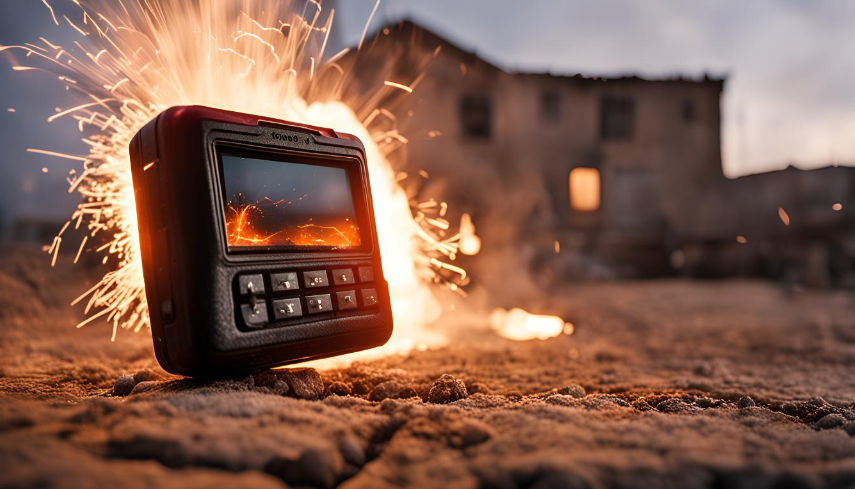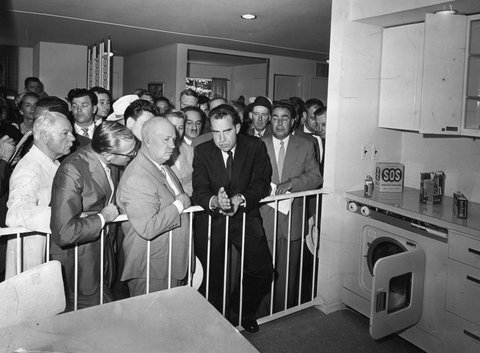July 24, 1959 – During the grand opening ceremony of the American National Exhibition in Moscow, Vice President Richard Nixon and Soviet leader Nikita Khrushchev engage in a heated debate about capitalism and communism in the middle of a model kitchen set up for the fair. The so-called “kitchen debate” became one of the most famous episodes of the Cold War. In late 1958, the Soviet Union and the United States agreed to set up national exhibitions in each other’s nation as part of their new emphasis on cultural exchanges. The Soviet exhibition opened in New York City in June 1959; the U.S. exhibition opened in Sokolniki Park in Moscow in July. On July 24, before the Moscow exhibition was officially opened to the public, Vice President Nixon served as a host for a visit by Soviet leader Khrushchev. As Nixon led Khrushchev through the American exhibition, the Soviet leader’s famous temper began to flare. When Nixon demonstrated some new American color television sets, Khrushchev launched into an attack on the so-called “Captive Nations Resolution” passed by the U.S. Congress just days before. The resolution condemned the Soviet control of the “captive” peoples of Eastern Europe and asked all Americans to pray for their deliverance. After denouncing the resolution, Khrushchev then sneered at the U.S. technology on display, proclaiming that the Soviet Union would have the same sort of gadgets and appliances within a few years. Nixon, never one to shy away from a debate, goaded Khrushchev by stating that the Russian leader should “not be afraid of ideas. After all, you don’t know everything.” The Soviet leader snapped at Nixon, “You don’t know anything about communism–except fear of it.” With a small army of reporters and photographers following them, Nixon and Khrushchev continued their argument in the kitchen of a model home built in the exhibition. With their voices rising and fingers pointing, the two men went at each other. Nixon suggested that Khrushchev’s constant threats of using nuclear missiles could lead to war, and he chided the Soviet for constantly interrupting him while he was speaking. Taking these words as a threat, Khrushchev warned of “very bad consequences.” Perhaps feeling that the exchange had gone too far, the Soviet leader then noted that he simply wanted “peace with all other nations, especially America.” Nixon rather sheepishly stated that he had not “been a very good host.” The “kitchen debate” was front-page news in the United States the next day. For a few moments, in the confines of a “modern” kitchen, the diplomatic gloves had come off and America and the Soviet Union had verbally jousted over which system was superior–communism or capitalism. As with so many Cold War battles, however, there was no clear winner–except perhaps for the U.S. media, which had a field day with the dramatic encounter.
July 24, 1959 – During the grand opening ceremony of the American National Exhibition in Moscow, Vice President Richard Nixon and Soviet leader Nikita Khrushchev engage in a heated debate about capitalism and communism in the middle of a model kitchen set up for the fair. The so-called “kitchen debate” became one of the most famous episodes of the Cold War. In late 1958, the Soviet Union and the United States agreed to set up national exhibitions in each other’s nation as part of their new emphasis on cultural exchanges. The Soviet exhibition opened in New York City in June 1959; the U.S. exhibition opened in Sokolniki Park in Moscow in July. On July 24, before the Moscow exhibition was officially opened to the public, Vice President Nixon served as a host for a visit by Soviet leader Khrushchev. As Nixon led Khrushchev through the American exhibition, the Soviet leader’s famous temper began to flare. When Nixon demonstrated some new American color television sets, Khrushchev launched into an attack on the so-called “Captive Nations Resolution” passed by the U.S. Congress just days before. The resolution condemned the Soviet control of the “captive” peoples of Eastern Europe and asked all Americans to pray for their deliverance. After denouncing the resolution, Khrushchev then sneered at the U.S. technology on display, proclaiming that the Soviet Union would have the same sort of gadgets and appliances within a few years. Nixon, never one to shy away from a debate, goaded Khrushchev by stating that the Russian leader should “not be afraid of ideas. After all, you don’t know everything.” The Soviet leader snapped at Nixon, “You don’t know anything about communism–except fear of it.” With a small army of reporters and photographers following them, Nixon and Khrushchev continued their argument in the kitchen of a model home built in the exhibition. With their voices rising and fingers pointing, the two men went at each other. Nixon suggested that Khrushchev’s constant threats of using nuclear missiles could lead to war, and he chided the Soviet for constantly interrupting him while he was speaking. Taking these words as a threat, Khrushchev warned of “very bad consequences.” Perhaps feeling that the exchange had gone too far, the Soviet leader then noted that he simply wanted “peace with all other nations, especially America.” Nixon rather sheepishly stated that he had not “been a very good host.” The “kitchen debate” was front-page news in the United States the next day. For a few moments, in the confines of a “modern” kitchen, the diplomatic gloves had come off and America and the Soviet Union had verbally jousted over which system was superior–communism or capitalism. As with so many Cold War battles, however, there was no clear winner–except perhaps for the U.S. media, which had a field day with the dramatic encounter.











